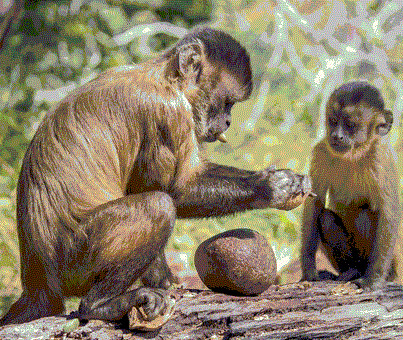Culture-and-cognition research on the ISIS Frontline
Are decisions in extreme conflicts driven by cost–benefit calculations? The work of Scott Atran and colleagues on ISIS fighters casts doubt on this common social science assumption. It
The Extension of Biology Through Culture
A juvenile capuchin monkey observes a skilled adult male eating a nut it has just broken using a hammerstone. This picture illustrates a special issue of PNAS on the Extension of Biology Through
Symposium on Helming, Strickland, and Jacob, “Solving the puzzle about early belief-ascription”
The Brains Blog is launching a Mind & Language symposium on Katharina A. Helming, Brent Strickland, and Pierre Jacob’s “Solving the Puzzle about Early Belief-Ascription” from the
Alberto Acerbi blogs on new books on cultural evolution
In his excellent blog [1], Alberto Acerbi draws attention to three recent books on cultural evolution:
"Tim Lewens’ Cultural Evolution [2] (Oxford University Press) is an excellent take on the
Pulotu – database of Pacific Religions
If good ethnographic databases works as a guilty pleasure for you, you may want to have a look at Pulotu (pulotu.com), and thank Prof. Russell Gray and his team. Pulotu is a remarkable database of
For the record: A commentary by Csibra, Senju, et al. on gaze following
In 2008, Atsushi Senju and Gergely Csibra published in Current Biology (18, 668–671) an often quoted and important contribution to natural pedagogy theory: “Gaze following in human infants
State of the art research on social behavior
In Current Opinion in Behavioral Sciences 2015, 3, a really useful open access collection of review papers on state of the art research on social behavior edited by Molly Crockett and Amy Cuddy. From
An evolutionary framework for the study of teaching
A new article or obvious cognition-and-culture relevance by Michelle Ann Kline on "How to learn about teaching: An evolutionary framework for the study of teaching behavior in humans and other
Social Norms and Cultural Dynamics
A Special Issue on "Social Norms and Cultural Dynamics" of Organizational Behavior and Human Decision Processes (Volume 129, July 2015) Edited by Michael Morris, Ying-yi Hong and Chi-Yue Chiu.
For
Social Anthropology meets “the cognitive challenge”
Social Anthropology devotes an exciting special issue to "taking up the cognitive challenge", edited by Rita Astuti and Denis Regnier, with contributions by (among others) Tamara Hale, Charles
Sign language as a window into universally accessible linguistic biases
A very interesting new article: "Event representations constrain the structure of language: Sign language as a window into universally accessible linguistic biases" by Brent Strickland, Carlo Geraci,
Scott Atran’s address to the UN security council
It is not everyday that an anthropologist is asked to speak before the security council: Scott Atran did, on the 23d of April. See video here [1].
[1] "Scott Atran: The Youth Need Values and
Astuti and Bloch on “Incest, intentionality, and morality”
A thought-provoking article by Rita Astuti and Maurice Bloch, "The causal cognition of wrong doing: incest, intentionality and morality," in Frontiers in Psychology, 18 February 2015.
From the
Should preferences based on authoritarianism and social dominance be treated as moral?
An interesting critical discussion of Jonathan Haidt's apprach to morality from a social psychology and political science point of view: "Another Look at Moral Foundations Theory: Do Authoritarianism
What Explains the Emergence of Moralizing Religions?
An ambitious article: "Increased Affluence Explains the Emergence of Ascetic Wisdoms and Moralizing Religions", by Nicolas Baumard, Alexandre Hyafil, Ian Morris, and Pascal Boyer in Current Biology,
A Cognitive Science of Theology?
A new, interesting, and original book by Helen De Cruz and Johan De Smedt: A Natural History of Natural Theology: The Cognitive Science of Theology and Philosophy of Religion. MIT Press 2014.
Over
Is probabilistic cognition universal?
An interesting paper by Laura Fontanari, Michel Gonzalez, Giorgio Vallortigara, and Vittorio Girotto: "Probabilistic cognition in two indigenous Mayan groups", forthcoming in PNAS.
Abstract:
"Is
Has a decimal point error misled millions into believing that spinach is a good source of iron?
A great cultural epidemiology story by Ole Bjørn Rekdal, "Academic urban legends," in Social Studies of Science (2014, 44(4)) freely available here.
Abstract:
"Many of the messages presented in
Random choice among the Kantu, swidden agriculturalists of Kalimantan
An excellent post by Michael Schulson at Aeon magazine entitled "How to choose? When your reasons are worse than useless, sometimes the most rational choice is a random stab in the dark," showing,
Babies’ and birds’ causal understanding
A very interesting comparison between crows and humans in a new (free access) paper in Proceedings of the Royal Society B entitled "Of babies and birds: complex tool behaviours are not sufficient for
Combinatorial Communication in Bacteria?
Here is a challenge to standard views about the evolution of linguistic generativity: "Combinatorial Communication in Bacteria: Implications for the Origins of Linguistic Generativity" by Thomas C.
Negatively-Biased Credulity and the Cultural Evolution of Beliefs
A new article by Dan Fessler, Anne Pisor,& David Navarrete, highly relevant to cultural epidemiology in PLoS ONE.
Abstract:
The functions of cultural beliefs are often opaque to those who hold
Making sense of early false-belief understanding
A new article from Helming, K. A., Strickland, B., & Jacob, P. (2014). Making sense of early false-belief understanding. Trends in Cognitive Sciences.
Abstract:
We address the puzzle about early
The Content of Our Cooperation, Not the Color of Our Skin
A new, important article by David Pietraszewski, Leda Cosmides, and John Tooby: The Content of Our Cooperation, Not the Color of Our Skin: An Alliance Detection System Regulates Categorization by






